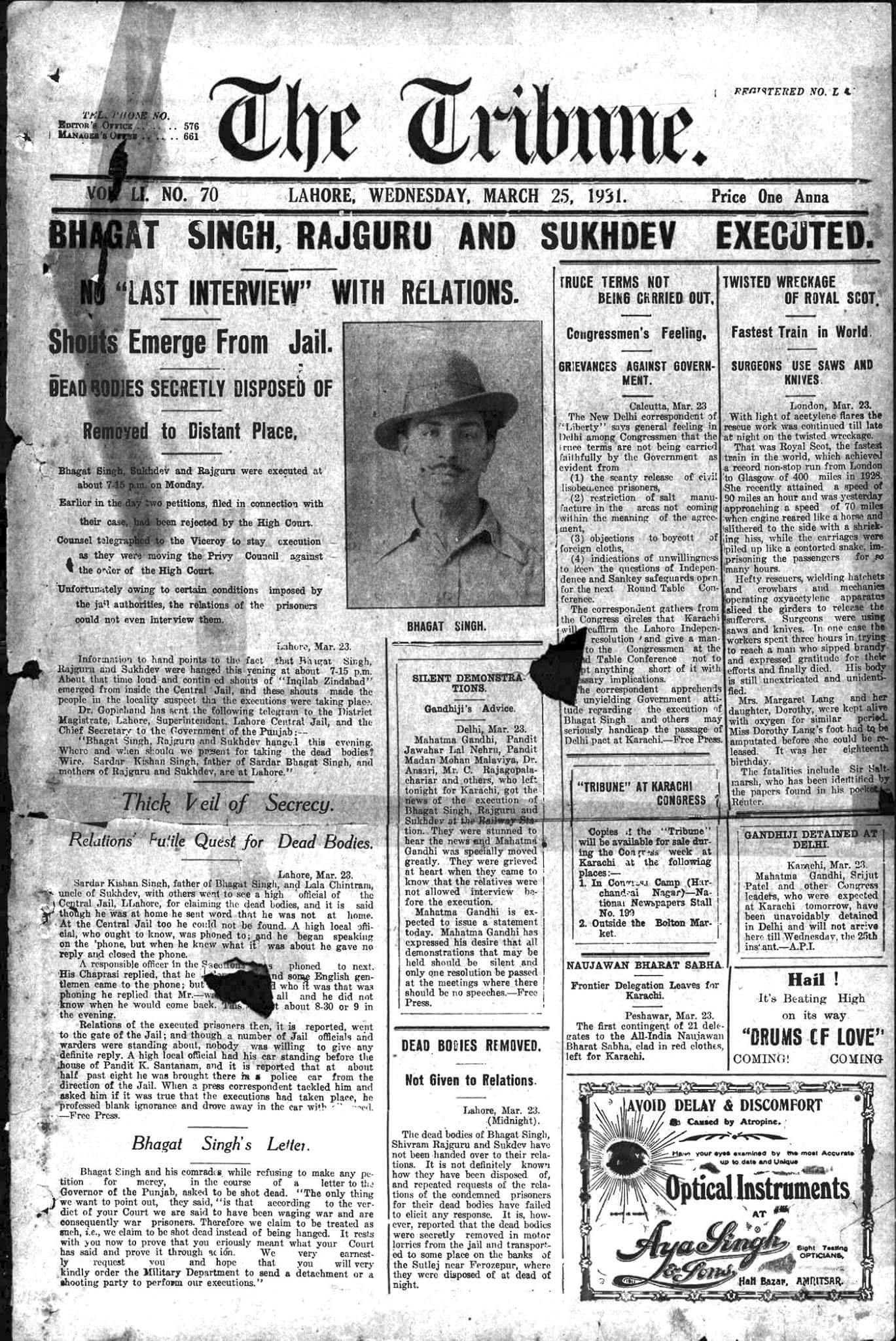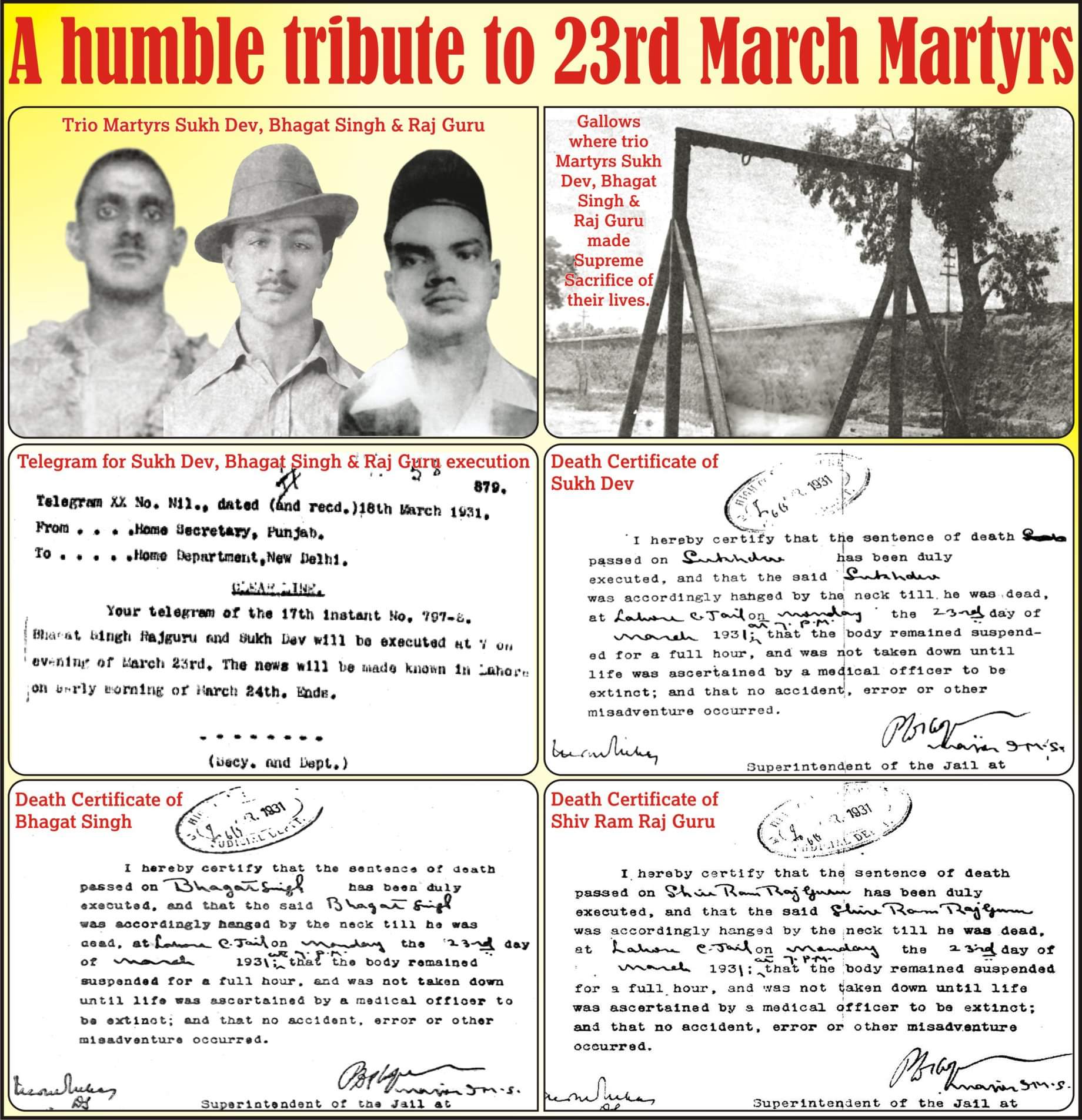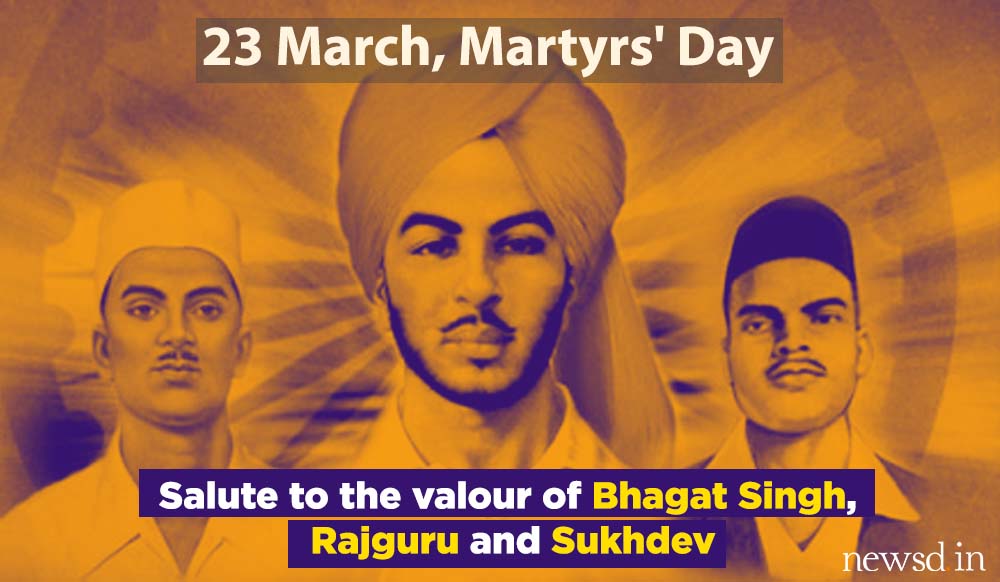23rd March marks 88th martyrdom of Bhagat Singh, Sukhdev Thapar and Shivaram Rajguru, the three revolutionaries of freedom movement who were hanged by the British Raj for acting on their dream of freedom through mixed blend of both violence and non-violence. Considering them just as gun-toting nationalists’ remains our drawback and there’s much more to know beyond their violent tactics.
Either we have turned a blind eye to their views or partially we understand their political stand only mere out of fanaticism.
We have kept them at a place in our heart, loaded with emotions but larger question remains:
Did we understand the motive behind their sacrifice?
Do we practice their ideals and stand against Casteism, Communalism, etc?
Answer remains a disheartening NO! If so, let us try to decode their personality and views which remain relevant even after eight decades of martyrdom.
Symbolising Bhagat Singh alone, disrespect to martyrdom:
It is a growing fashion or trend to depict Bhagat Singh alone in writings, speeches, pictures, documentary movies, theatre play, etc but its patently incorrect and misleading to frame Bhagat Singh alone without his co-patriots, Sukhdev and Rajguru.
Even these were words of martyr’s mother, Mata Vidyawati (mother of Bhagat Singh) – “My son does not look nice standing alone, it behoove that he should be standing along with his Comrades.”
The message has great meaning that while remembering Bhagat Singh we must remember his great comrades who sacrificed their lives to give that revolutionary movement and people great impetus.
In this context, leader of the Hindustan Socialist Republican Association (HSRA), Shiv Verma did absolute justice to his fellow comrades by writing down a book named ‘Samsmritiyan’ (Reminiscences) which included all experiences of the freedom movement days.
Sukhdev and adversaries:
Sukhdev’s role in the revolutionary movement was that of a brain behind organizational functioning. His skills in steering party activities helped the movement sustain British rule’s atrocious atrocities and carrying out their battle.
Few days before hanging, Sukhdev had penned down a letter criticizing M.K.Gandhi in which he wrote, ―You are issuing appeals to us that we should call off our activities but you have not advanced any arguments in support of your appeal;
Under these circumstances, your appeals corroborate only the plain truth that you are helping the administration in crushing the revolutionary movement…hence it is our earnest request to you, to discuss the matter with some of the revolutionaries who are jailed, or cease issuing such appeals. Kindly adopt any one of the two, and adhere to that in all sincerity.
After his hanging, this letter was later published by MK Gandhi in his newspaper, Navjivan. This instance of expression of disagreement polemically by Sukhdev and its dignified response by M.K.Gandhi reflects the battle of perception and not anything personal unlike present day politics.
Rajguru’s urge for sacrifice:
Rajguru was an organizational man rather than a thinker. He did not take too much interest in reading and writing but his inclination was more on other organizational responsibilities.
On Rajguru, Shiv Verma wrote in his book- during the days of our absconding he played a prominent: part in keeping life alive with songs, tumult, laughter and joviality. Rajguru’s selfless patriotism can be measured from an incident where he became adamant against decision of Bhagat Singh and B.K.Dutt to throw bomb in central assembly hall. When his request got rejected by the central committee, he rushed down to Azad within no time to put forward his argument.
In reply to him, Azad argued back, “It will entail a statement in court. You do not know English. You will be locked up separately from Bhagat Singh. In that event if you cannot explain through a good statement the political importance of the bomb blast the endeavour would flop.”
Replying to this argument of Azad, Rajguru said, “Ask Bhagat Singh to prepare a statement in English for me. I shall learn it by rote to the last mark of punctuation. There will not be a single mistake.” Such was his serious urge towards nation’s liberation with a vision.
In party affairs, he lacked interest in reading books, novels, etc after emphasizing on ideology of Socialism, he started drawing parallel between his past life experiences (which included poverty, social humiliation) and basic tenets of the ideology which underlines reducing the gap between a rich and a poor. This brought clarity for Rajguru on organization’s ideology.

The Last Message:
Before hanging Bhagat Singh had written in his last letter to his younger brother: The dusk of my like is close. Like the flickering light of the morning lamp my life will mingle with the light of the dawn. Our ideals and our thoughts will spread awareness throughout the world like the flash of lightening.

A day before the noose tightened around the neck, on 22nd March in reply to a question from jail inmates that if possible he would like to escape gallows and live ? Bhagat Singh for last time replied in writing-
Naturally I must have desire to live. I do not want to hide it. But my living is on one condition. I cannot live under imprisonment or with conditions imposed.
My name has become a symbol of the Indian Revolution .It is the ideals of Our Revolutionary Party and the sacrifices of my Comrades that have raised me to such a height . I have been raised to such a great height that by living I may not be able to achieve higher place than it.
Today my weaknesses are not known to people. If I escape gallows then those will be known and the symbol of Revolution may faint or may be lost. But my walking to the gallows boldly and with broad smile, the mothers in India will desire their children to follow me. This will increase the number of people to such an extent that the progress of Revolution will be impossible to be stopped by all the devilish powers of Imperialism.
Yes one thought comes to mind. I had thousands of desires to serve the country and humanity but sorry only a fraction of it could be fulfilled. If I would have lived free then there was chance to fulfill these.
Except for this no other thought ever came to me to escape from gallows. Who could be more lucky than me? It is a matter of pride for me. Now very eagerly wait for the last test. I desire that it should come early.
The journey of three brave hearts in mid 1920s should be acknowledged as an enthralling transition from violence to non-violence. From execution of JP Saunders, throwing harmless bombs in Central Assembly hall to mind boggling hunger strike for rights of political prisoners are eye opening lessons for socio-politically conscious contemporary generation of this country.
The miserable conditions of Indian society that fired motivations of young revolutionaries are by and large present even today. Bhagat Singh, Sukhdev and Rajguru were foot soldiers of nation’s freedom movement who possessed both intellect and activism integrated with a vision for an egalitarian India. We need to realize that martyrdom of three revolutionaries deserve more than our emotions and demands from us to act upon and in simple words there life itself is a message for all.
(With Inputs: Prof. Jagmohan Singh, Bhagat Singh’s maternal nephew)



















